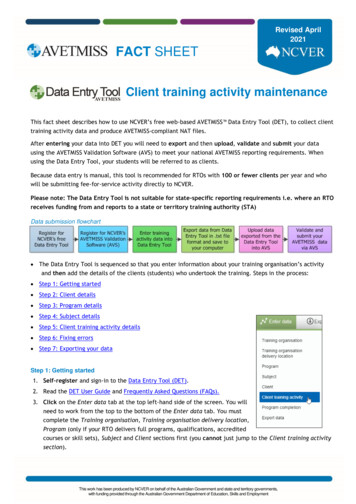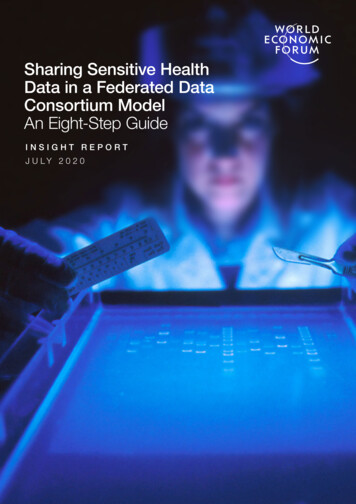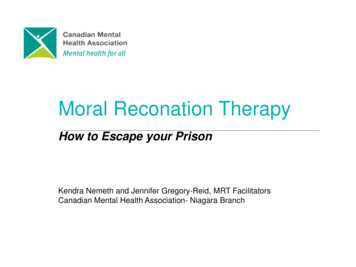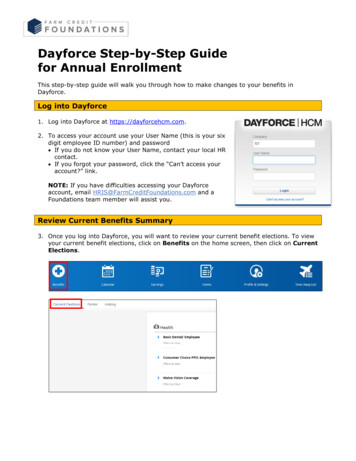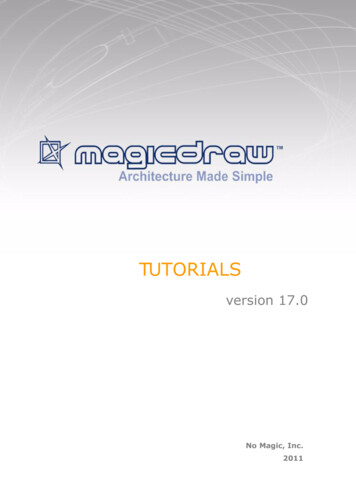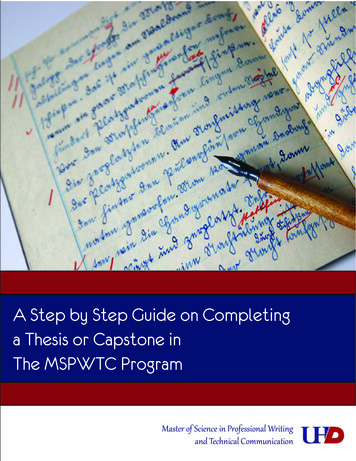
Transcription
A Step by Step Guide on Completinga Thesis or Capstone inThe MSPWTC ProgramMaster of Science in Professional Writingand Technical Communication1
A Step by Step Guide on Completinga Thesis or Capstone inThe MSPWTC ProgramUniversity of Houston-DowntownHow to Read This DocumentYou can read this document in two ways:1. You can start at the front cover and read paragraph by paragraph until you get to the back cover. Whenyou encounter how-to information that differs between thesis and capstone, you’ll see color variationsenabling you to focus on either the thesis or capstone project.2. Or you can start with the timeline charts, Figure 1 (page 11) and Figure 2 (page 13). At each juncture,you can click on the sequence number of each step to be linked to explanatory text about it.Regardless of how you approach your thesis or capstone, this document - produced by students in the Spring2011 MSPWTC ENG 5340 Project Management class - includes the most important pieces of informationregarding the thesis or capstone. Information in this document was gathered by researching otherproject guides and interviewing students and faculty in the MSPWTC program. Please note that this is anunofficial guide and not a university document.Danielle WestJoyce Mullett2Gloria BelloFelicia Bates
ContentsIntroduction. 4Acknowledgements. 4Differences Between Thesis and Capstone. 5Your Thesis. 5Your Capstone. 6Course Descriptions.6Roles and Expectations. 7Choosing Your Topic. 9Planning Your Timeline. 9Creating and Revising Your Proposal. 14Researching Your Topic. 20Starting the Writing Process. 21Sections Required and Recommended. 21The Defense. 22Binding Requirements. 24Conclusion. 24FiguresFigure 1: Approval Semester. 11Figure 2: Completion Semester . 13Figure 3: Sample Timeline . 18FormsCPHS Application - Human Subjects. 25Thesis Proposal Form. 26Capstone Project Proposal Form. 27Thesis/Capstone Binding Request Form. 28LinksA List of Links. 293
IntroductionBeing students in the MSPWTC program, we had a lot of questions regarding the thesis or capstone that arerequired for completing the master’s program. We were given the opportunity in ENG 5340 ProjectManagement to investigate thesis or capstone guidelines, requirements, and processes.The following are some questions we had before our investigation: The GAC is the same committee that reviews my thesis or capstone, right? How do I start my thesis or capstone project? Do I have to be enrolled in specific courses to get my thesis or capstone completed?We hope that most, if not all, of your questions are answered in this project guide. Of course, if you havemore questions regarding the thesis or capstone, please see the graduate coordinator or other faculty members.They are great resources and there to help you through the program.AcknowledgementsThis guide was created by students for students to explain the process and requirements involved incompleting a MSPWTC thesis or capstone. It would have been impossible for us, as students, to have thismuch insight into these two projects without using resources outside our ENG 5340 Project Managementclassroom. Much of the information you read in this document is from the core of the MSPWTC program,the faculty and staff who mentor and teach us. Their knowledge was captured to produce this guide.This is a page of thanks dedicated to:Dr. MoosallyDr. JenningsDr. DuncanDr. SchmadekaSincerely,Danielle WestJoyce Mullett4Gloria BelloFelicia Bates
Difference Between Thesis and Capstone:Generally, a thesis is written for an academic audience—a contribution to an academic field of study related toProfessional Writing and Technical Communication. While a thesis is aimed at primarily an academicaudience, a capstone project is aimed at two audiences: a client who has established a need for a particulartype of document and the project committee who evaluates the rationale report that accompanies thedeliverable. This builds a connection between the academic components of the program and the application ofthat knowledge to a real-world context.Ideally, you will decide whether to do a thesis or a capstone prior to the semester in which you take ENG6390 Directed Research. It is required that you have completed 15 credit hours before enrolling in ENG6390 Directed Research. In order to make the right choice, you need to consider your long-term goals of yourdegree, as well as your areas of interest based on your experience in the program and the workplace.Your Thesis:Your thesis is a scholarly document that questions or otherwise contributes to an existing body of knowledge.Your thesis analyzes an existing concept, phenomenon, or text(s) in light of current theory and research.The thesis typically includes: An introduction describing the purpose, scope, and significance of the topic A section situating the topic in the context of the literature in the field A section explaining the research method and rationale A section developing results of the research method A conclusion that sums up the importance of the projectAfter completing 15 credit hours, you are ready to begin your thesis; this is a two-semester process. You beginwith three hours of ENG 6390 Directed Research to propose and gain approval of your topic. In thefollowing semester, you must complete ENG 6391 Thesis to develop and defend your paper. In order for youto earn credit for ENG 6391, the completed thesis must be approved by your project committee after thedefense.Typically a thesis does not exceed 100 pages, and it should demonstrate your ability to analyze, interpret, andsynthesize information; illustrate methodologies and procedures; and exhibit your ability to defend thecompleted project.5
Your Capstone:Your capstone requires execution of a project in which the final product is a potential deliverable for a workplace audience accompanied by a rationale report. Example deliverables include a training manual, a setof public relations materials, a website (design and content), or a usability assessment. The rationale reportshould document how the deliverable reflects the scholarly principles supporting the execution of thedeliverable.Like the thesis, you must have completed 15 credit hours in the program in order to begin yourcapstone. Once you fulfill this requirement, you must complete three hours of ENG 6390 Directed Researchto propose and gain approval of your project. In the following semester, you must complete three hours ofENG 6392 Capstone Project to develop and defend your project.Both the deliverable and the rationale report must be defended before your project committee. In order foryou to earn credit for ENG 6392, the completed project must be approved by your project committee afterthe defense.Course DescriptionsENG 6390 - Directed ResearchPrerequisite: Fifteen hours and graduate standing or departmental approval. Supports and guides studentresearch for thesis or capstone project. Students enrolled during this semester intend to propose and gainapproval for a thesis or capstone project.Note: In addition to the courses discussed in this document, ENG 6380 Field Experience (internship) isavailable to take the place of Eng 6390 Directed Research. Prerequisite: Fifteen hours and graduate standingor departmental approval. Provides industry experience for students. Writing or design projects developed inthe course may be tested and used for the capstone project or portfolio.The scope of this document does not include the internship course option above; please see the graduatecoordinator for more details.ENG 6391 - ThesisPrerequisite: Eighteen hours, ENG 6390 Directed Research, and graduate standing or departmental approval.Provides direction and support for students during the semester when they intend to complete the thesis.No credit is awarded until the thesis is approved by the project committee and the student has passed theirdefense on the thesis, and submitted a graduate portfolio. This course may be repeated until the thesis isapproved.ENG 6392 Capstone ProjectPrerequisite: Eighteen hours, ENG 6390 Directed Research or 6380 Field Experience (Internship), andgraduate standing or departmental approval. Provides direction and support for students during the semesterwhen they intend to complete the capstone. No credit is awarded until the capstone is approved by the projectcommittee and the student has passed their defense on the capstone, and submitted a graduate portfolio. Thiscourse may be repeated until the capstone isapproved.6
Roles and ExpectationsYour Role as a MSPWTC CandidateYou are the project manager! This is your project, so you control every aspect of it, from the topic you choose,to deciding your committee chair. You are the initiator of every interaction. Keeping a calendar of importantmeetings and deadlines will be a requirement and a huge help in making sure that your project goes smoothly.Many of the steps you must take are located in the middle of the timeline charts on pages 11 and 13 becauseyou must reach out to entities both within and outside of the MSPWTC program.MSPWTC Graduate Advisory Committee (GAC)The GAC is a committee that consists of MSPWTC faculty that review your proposal (that you will completein ENG 6390 Directed Research) and determines whether or not your project is appropriate. The committeecan reject or approve your proposal and ask for revisions. When reviewing your proposal, the GAC will offeradvice on how you should proceed with your project; this advice is separate from that of your projectcommittee. After your proposal is approved, the GAC will no longer take part in your project. The chair ofthe GAC is always the current graduate coordinator.Committee ChairAs the project manager, you choose your committee chair. You must choose a professor from the MSPWTCprogram to be your committee chair; there are some exceptions, but they need to be approved by thegraduate coordinator and the GAC. Requesting your committee chair is part of the MSPWTC ThesisProposal Form or MSPWTC Capstone Project Proposal Form that will be submitted to, and approved by, thegraduate coordinator and the GAC.Your committee chair will be your comrade and your mentor throughout the whole project. He or she willguide you through the entire process of writing and presenting your project. Make sure you choose someonewho you get along with; it is better to choose a professor that you work well with than one who is fluent inthe topic of your thesis or capstone. Of course, the ideal committee chair will have both of these qualities. Thecommittee chair will also manage the committee and facilitate the oral defense. Most importantly, he or sheshould be available to you for regular consultations through the entire project.This includes: Prompt feedback on drafts Strong advice on methodology and structure Enthusiastic encouragement7
Roles and Expectations (cont.)Project CommitteeThere are three members in the project committee: the committee chair, the second reader, and the thirdreader. The committee chair and the second reader are chosen by you and approved by the graduatecoordinator and the GAC, and the third reader is chosen and approved by the graduate coordinator alone.The third reader will not be chosen by the graduate coordinator until you are in the last semester of yourproject.Your committee chair will inform the other two members of your project committee of how you are doingand pass along your drafts for their review. They will be present during your defense and conduct a finalanalysis of your project. They will approve your project, approve it with revision requests, or reject yourproject.Committee for the Protection of Human Subjects (CPHS).You must have approval from this committee to carry out any research involving people, even simplequestionnaires.MSPWTC Graduate CoordinatorThe graduate coordinator is the chair of the GAC. Most of your forms and approvals will be reviewed by thegraduate coordinator.8
Choosing a Topic:Choose a topic as soon as possible. It is highly recommended that you start thinking about a topic when youenter the program—make notes along the way, even if you do not yet know if you want to do a thesis orcapstone. Think about interesting topics you have encountered in your classes or determine whether there areproblems or gaps in the Professional Writing and Technical Communication field. Talk to faculty who workin areas of interest to you.If you decide to write a thesis, think of research questions that you have: What is not yet known about theProfessional Writing and Technical Communication field? What is an area of controversy in the literatureyou have used during your first 15 credit hours? Is there a way to get evidence to support one controversy oranother? Is there a literacy problem or lack of reading material on a determined subject?Capstones are more about products. You need to find out what is needed by a particular organization oragency and determine what kind of product would fulfill this need. A capstone project may be a solution for aparticular workplace.Planning Your TimelineDuring your first 15 hours in the MSPWTC programIdentify a topic for your thesis or capstone project. Discuss your proposed topic to potential members of yourproject committee or with the MSPWTC Graduate Coordinator.It may seem early, but it’s during your first 15 hours that you should investigate the requirements anddeadlines for submitting the forms associated with getting your thesis or capstone approved andcompleted.Such forms include the following: MSPWTC Thesis Proposal Form MSPWTC Capstone Project Proposal Form Committee for the Protection of Human Subjects (CHPS) Form Thesis or Capstone Binding Request Form Workplace Release Form9
Planning Your Timeline (cont.)Gaining Approval of Your Thesis or Capstone Project After You’ve Completed 15 CreditHoursComplete the steps below to gain approval for your thesis or capstone.1. You need one semester to get your project approved. Make a plan that includes registering for ENG6390 Directed Research, acquiring and completing appropriate forms, gaining approval of the relevantcommittees, as well as assigning deadline dates for the semester.2. Invite faculty members to be your project committee chair and second reader. The thirdcommittee member will be assigned by the graduate coordinator in the completion semester.3. Secure graduate coordinator approval for ENG 6390 Directed Research4. Weeks 1 - 3: Use this time to develop your thesis or capstone proposal.5. Download the appropriate MSPWTC thesis or capstone proposal form and the CPHS form (if appropriate for your project)6. Complete the eight-page CPHS form (if necessary for your project). Submit it to the CPHS to meet theirschedule.7. The CPHS meets monthly and will approve or deny your proposal.8. Include the CPHS approval of your research with your thesis or capstone proposal.9. Complete the MSPWTC thesis or capstone proposal form, including all attachments.10. No later than the 4th Monday: Submit your project proposal to the graduate coordinator.11. The graduate coordinator reviews your proposal and forwards it to the Graduate Advisory Committee(GAC).12. The GAC approves your proposal and/or recommends revisions.13. Week 7: Make revisions recommended by the GAC. Edit and proofread your proposal.14. No later than the 8th Monday: Submit your proposal to your thesis or capstone committee.15. Your project committee reviews your proposal.16. Week 10: Expect official approval of your proposal from your approved committee.17. You need one semester to complete your thesis or capstone. Make a plan that includes registering forENG 9391 Thesis or ENG 6392 Capstone Project.18. Secure graduate coordinator approval for ENG 6391 or ENG 6392.10
Planning Your Timeline (cont.)Figure 1: Approval SemesterSeven entities play a role in your endeavor. On the timeline chart, the activities of each entity in the projectapproval process are shown in a horizontal band of color. Numbers indicates the sequence of steps you musttake, and arrows show which entity is recipient of an action.11
Planning Your Timeline (cont.)Completing Your Thesis or Capstone ProjectReiterating the final two steps from of your approval semester on the previous page, follow the steps below tocomplete your thesis or capstone.17. You need one semester to get your project completed. Make a plan that includes registering for theappropriate coursework and researching the logistics of your defense presentation.18. Secure graduate coordinator approval for ENG 6391 Thesis or ENG 6392 Capstone Project.19. Draft your thesis or capstone to meet the deadlines required by ENG 6391 or ENG 6392.20. Verify that a third committee member has been named.21. Submit a 60% complete draft to your project committee in accordance with the schedule requirements ofa Spring or Fall semester.22. Your committee chair reviews your draft and provides comments.23. Incorporate the committee chair’s comments and submit a 80% complete to your committee inaccordance with the schedule requirements of a Spring or Fall semester.24. Your committee reviews your draft and provides comments.25. Incorporate the committee chair’s comments and submit a complete, defendable project to yourcommittee in accordance with the schedule requirements of a Spring or Fall semester.26. Your committee reviews your project and provides comments.27. Confirm all logistical requirements for your defense presentation.28. Defend your project in accordance with the schedule requirements of a Spring or Fall semester.29. Your committee hears your defense and either passes it, passes it with revisions, or rejects it.30. You submit your revised final project to your committee chair.31. The chair reviews the revisions and denies or accepts them.32. Download the Binding Request Form.33. Submit the Binding Request Form with three copies of your project to the graduate coordinator. (Followthe Binding Requirements section.)34. The graduate coordinator reviews the package and provides it to the library.12
Planning Your Timeline (cont.)Figure 2: Completion SemesterSeven entities play a role in your endeavor. On the timeline chart, the activities of each entity in the projectcompletion process are shown in a horizontal band of color. Numbers indicates the sequence of steps youmust take, and arrows show which entity is recipient of an action.13
Creating and Revising Your Proposal (written in ENG 6390 Directed Research)The purpose of writing a thesis or capstone proposal is to demonstrate to the Graduate Advisory Committee(GAC) that you have not only identified a topic of interest for your thesis or capstone but also have anorganized plan for completing it. Your proposal helps the GAC understand your proposed topic, so it isimportant that your proposal provides the necessary information in order for them to accept it. Your proposalwill be completed in ENG 6390 Directed Research, and this proposal is required in order to get your projectapproved. To successfully complete a proposal, you must address specific sections as identified in either theMSPWTC Thesis Proposal Form or the MSPWTC Capstone Project Proposal Form, depending on whichproject you choose to complete.Reasons why students are asked to revise their thesis or capstone proposal include the following: Insufficiently focused thesis or capstone topic (e.g., too big to be feasible) Vague description of deliverables (if completing a capstone project) Lack of grounding in MSPWTC practices and research or lack of articulation of this grounding Poorly written proposals, lacking the section requirements as identified in the proposal formRequired Sections in the Proposal FormsThe required sections for the thesis or capstone proposal vary slightly. Below are the required sections thatmust appear in either the MSPWTC Thesis Proposal Form or the MSPWTC Capstone Project ProposalForm.Thesis Proposal Form Purpose and scope Statement of the proposed method andrationale, with references to academic sources asnecessary Timeline for completion of thesis,including proposed schedule for meeting withadvisor(s), deadlines for completion of researchand chapters/sections, projected defense date Consideration of any potential obstacles and thefeasibility of the proposed thesis Evidence that necessary workplace approvalshave been granted (attach as appendix) Evidence that necessary human subject researchapproval has been requested or granted (attachas appendix) Preliminary list of resources that you will use,with annotations describing their relevance toyour project14Capstone Project Proposal Form Purpose and scope of project (includingdescription of intended audience and deliverable) Statement of the proposed method for achievingthe desired deliverable, with references to academicsources and other resources as necessary Summary of your background/experience/knowledge that qualifies you for this project Timeline for completion of capstone,including proposed schedule for meeting withadvisor(s), deadlines for completion of researchand chapters/sections, projected defense date Consideration of any potential obstacles and thefeasibility of the proposed capstone Evidence that necessary workplace approvals havebeen granted (attach as appendix) Evidence that necessary human subject researchapproval has been requested or granted (attach asappendix) Preliminary list of resources that you will use, withannotations describing their relevance to yourproject
Creating and Revising Your Proposal (cont.)Description of Required SectionsBelow are descriptions for successfully completing each required section in the proposal form. Thedescriptions are inclusive of both the thesis and capstone; however, wherever the description pertainsspecifically to the either the thesis or capstone project, it is indicated.PurposeThe purpose statement should tell the GAC what you plan to discuss for your project.This statement should be Specific Clear Goal-orientedIf completing a thesis, the statement also needs to state the significance of your paper.Example:Ineffective purpose statement: I propose to discuss problems in the workplace.Critique: The statement is too vague, and there is no clear expectation as to what thereader (the GAC) will learn. Be more specific by stating the “problems” as well as thegoal of your thesis paper.Effective purpose statement: I propose to discuss the impact of negative employee-supervisorworkplace relations on productivity improvement efforts in the workplace.Critique: The statement specifies the problem the paper will address (employee-supervisor relations) and what the reader will gain or learn (how to improve productivityin the workplace).15
Creating and Revising Your Proposal (cont.)Purpose (cont.)If completing a capstone, the statement also needs to state what you plan to present as a deliverable for yourproject. You should mention the intended audience for your deliverable, and mention why thedeliverable justifies the intended audience. You should ask yourself: Why this deliverable as opposed toanother? Is there a need for this deliverable and why? Why this audience? What will this project help theintended audience to do? What is the significance of this project? Answering these questions will help theGAC understand the rationale behind your topic.Example:Ineffective purpose statement: I propose to create a brochure for Westmont Hospital.Critique: The statement is too vague, and there is no clear explanation of the intendedaudience (who the brochure is for, not just the place the brochure is for). Be morespecific by stating the direct intended audience and what the audience will gain from thedeliverable.Effective purpose statement: I propose to create a brochure for Westmont Hospital that targetspatients with Chronic Obstructive Pulmonary Disease (COPD). The deliverable will give COPDpatients options for treatment to help cure the disease. Currently, COPD patients at WestmontHospital are ill-informed as to their treatment options, and this brochure will give them treatmentoptions in the next step of their diagnosis.Critique: The statement specifies a current problem (patients are ill-informed) and whatthe intended audience will gain from the deliverable (treatment options).ScopeThis term describes the limits or boundaries of what you plan to do with your topic by identifying the thesisor capstone’s major objectives. Your scope section should answer the following questions: What subject matterwill you use to support your identified purpose? What sub-topics will you discuss, and how are they related toeach other and the overall thesis or capstone? Which aspects of your topic will not be addressed?Your scope should be specific and reachable within the amount of time you are in the graduate program, sounderstand that you work within a clearly defined scope.If completing a thesis, for example, a paper on style guide efficacy could be limited to addressing only styleguides produced in 2011 for corporations with 50 employees or fewer. However, you also would not want towrite on a topic so narrow that you can produce only a 10-page thesis. That document would be too shallowand short for a master’s thesis document.If completing a capstone, for example, you would not want to plan to write a book as a deliverable for yourtopic. That is way too much work for a master’s capstone. You also would not want to write on a very narrowtopic that would produce only a 5-page rationale report (as accompanied with your deliverable). Thatdocument would be too shallow and short for a master’s capstone.16
Creating and Revising Your Proposal (cont.)Scope (cont.)Identifying the scope of your thesis or capstone in the proposal tells the GAC the extent of your research andallows you to recognize deviations in your plan after you have started your project. As you write, your scopemay change from what you initially identified in your proposal. It is always best to inform members of yourcommittee.Statement of Proposed MethodThis section should include methods you will use to gather the information that you will include in yourthesis or capstone. Examples of methods include interviews, surveys, or library/database research. Please referto the Researching Your Topic section of this guide for further help in conducting research. The methods youselect (interviews, surveys, or library/database research) depend on what your topic is. The sooner you haveidentified your topic, the sooner you can identify your methods for completing it.As you identify which methods you will choose for your paper, keep in mind that methods/academic sources/practices acquired in the MSPWTC program are preferred. Your thesis or capstone should demonstrate thatthis master’s program has helped you to complete it.In this section, state the methods by which you will complete your thesis or capstone, and justify why eachmethod is needed to complete it. The GAC wants your ra
After completing 15 credit hours, you are ready to begin your thesis; this is a two-semester process. You begin with three hours of ENG 6390 Directed Research to propose and gain approval of your topic. In the following semester, you must complete ENG 6391



